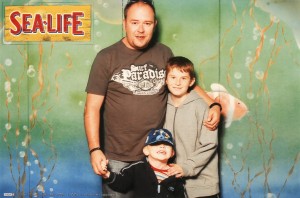 I've had all I can stand, I can't stand no more....
I've had all I can stand, I can't stand no more....I am sick, sick SICK of hearing that for my surfaces to be 'clean' I need to have killed all the bacteria as well, for the sake of my children. What utter, pointless, dishonest, health-&-safety crap.
Firstly, the bloody Dettol advert is in itself misleading. It states quite clearly that "1 bacteria can become 2 million overnight", so you should use Dettol to be clean and safe. It then tells you it kills 99.9% of bacteria - thus ensuring that when you use it after dinner you're going to leave 1% remaining. Which means you'll be well past that 2 million count by breakfast anyway.
Bacteria Maths 101:
99.9% of 2 million = 1,998,000. Leaving 2000. So if 1 can get to 2 million overnight, that means even if you start with 2 million then use this, the next morning you'll have two billion of the hardy little buggers, all of which come from the original stock that survived your chemical attack. Futile, innit?
Secondly - who the hell says that every surface in the house needs to be sanitised to within an inch of its life? I don't plan to eat sushi out of my sink, nor have a quick snack of steak tartare on my kitchen floor. For that matter, neither will my 3yo. And I'll be making my son scrambled eggs, not performing an appendectomy on him (though if he wakes me up at 0530 again, I may feel some temptation. . . .)
For the same reason, why on earth do I need to kill off every single bacteria present on the *inside* of my toilet? I want it looking clean, sure - but let's face it, if I wake up thirsty in the night I'm probably going to grab a glass of water from the tap, not dip a glass into the lavatory bowl. Even if I'm pretty drunk.
I believe - I truly, absolutely believe - that it's hugely important for children to be *exposed* to bacteria. Pretty much all of us grew up playing outside, making (and probably eating) mud pies, splashing in puddles and $DEITY knows what else. Sure, some of us got sick. But the really cool bit is that our bodies defended us from the illness when we got sick, and in doing so developed in us a resistance for the next time some nasties came along.
I know the 'health and safety, protect kids at all costs' would dearly love us to keep our offspring in sterile oxygen tents, breathing HEPA-filtered air scrubbed of any and all airborne pathogens - and they do their level best to guilt-trip us into doing so. But that's not how we started, not how we evolved. We didn't even have antibiotics until the 1940's - we certainly lacked 'anti-bacterial multi-surface biological cleany-sterilisy fluid stuff.
Maybe I'm wrong - but if we already have a plethora of antibiotic-resistant pathogens because of historical over-prescribing of antibiotics, aren't we increasing the risk to our children by reducing their exposure to the bacteria that surround us every day? Aren't we forcing our kids back into the shallow end of the gene pool, and increasing their risk of contracting something really nasty at some unspecified future point?
These adverts attempt to guilt-trip us into using their product to protect our children. I personally think that by their use, we're doing the exact opposite.
(Published on Dad-O-Matic, 9 Nov 2008)




